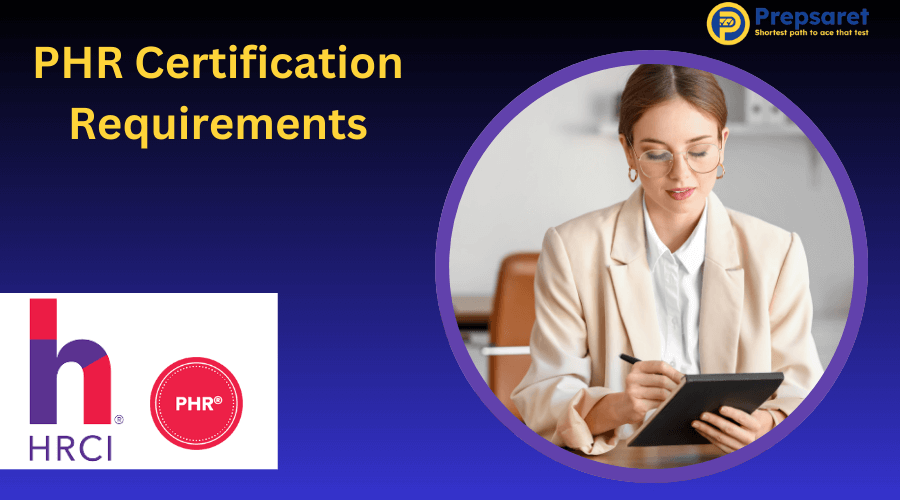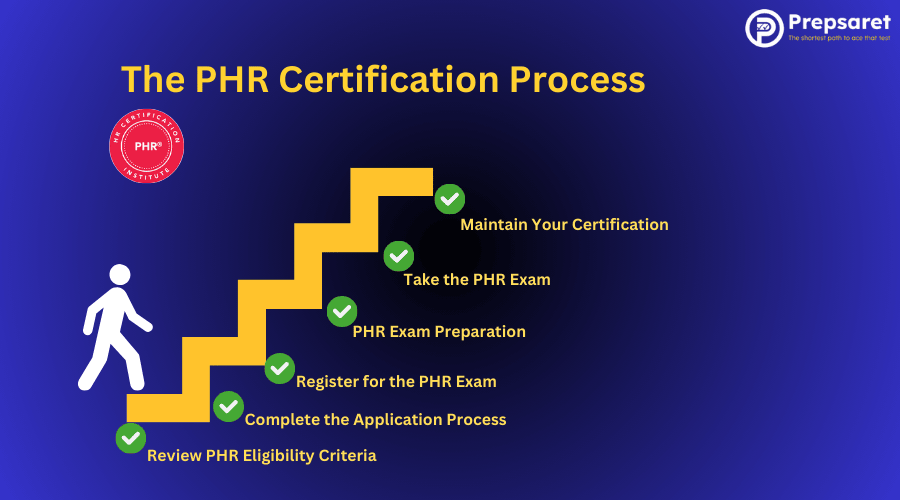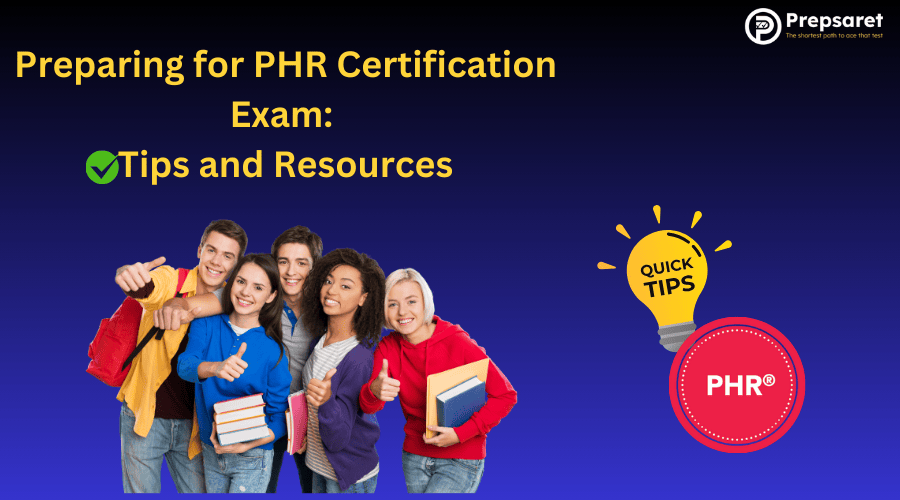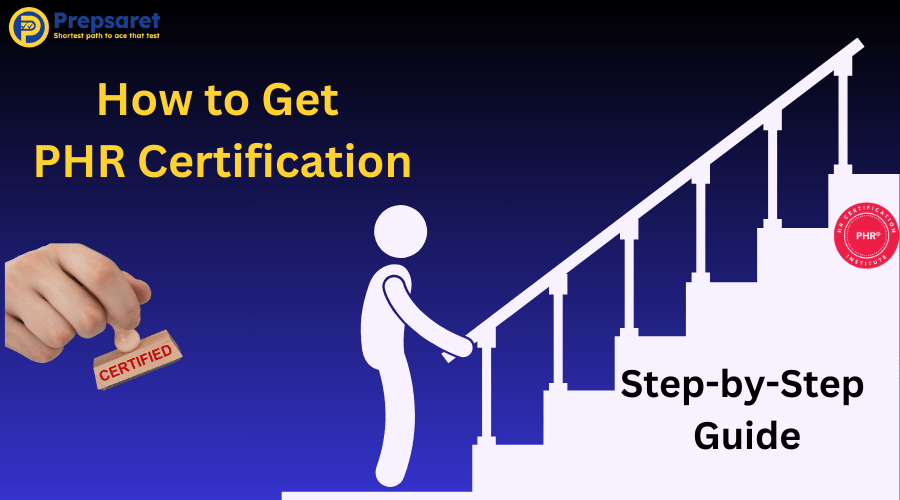Are you looking to take your HR career to the next level? Learning how to get PHR certification could be your ticket to greater professional recognition and expanded career opportunities.
The career benefits of PHR certifications are well-documented—ranging from increased earning potential to enhanced job security. Earning your PHR certification demonstrates your commitment to excellence in human resources.
With proper preparation and high-quality study materials, like those from Prepsaret, you can confidently pursue this valuable credential. This guide will walk you through everything you need to know about earning your PHR certification.
What is PHR Certification?
PHR certification stands for Professional in Human Resources certification, a credential designed for HR professionals who want to demonstrate their expertise and commitment to the field of human resources.
This certification validates your knowledge and skills in operational aspects of HR management, including U.S. laws and regulations.
When comparing PHR vs SHRM, it’s important to understand their different focuses. While PHR concentrates on technical and operational HR knowledge with a strong emphasis on U.S. employment laws, SHRM certification takes a more behavioral approach to HR practice. SHRM focuses on competency-based criteria and can be more globally applicable.
The PHR exam tests your knowledge across several functional areas:
- Business Management (20%)
- Talent Planning and Acquisition (16%)
- Learning and Development (10%)
- Total Rewards (15%)
- Employee and Labor Relations (39%)
One key difference between the two certifications is their governing bodies. PHR is administered by HRCI, an independent nonprofit organization, while SHRM certifications are managed by the Society for Human Resource Management.
Each certification carries weight in the industry, but some employers may prefer one over the other depending on their organizational needs.
PHR Certification Requirements and Eligibility Criteria

Understanding the PHR certification requirements is essential before beginning your certification journey. The PHR eligibility criteria establish clear guidelines about who can sit for the exam.
Education and Experience Requirements
The eligibility for Professional in Human Resources certification follows a sliding scale that balances education with professional HR experience:
- Master’s Degree or Higher: One year of HR experience.
- Bachelor’s Degree: Two years of HR experience.
- High School Diploma or Associate’s Degree: Four years of HR experience.
- No Degree: Four years of HR experience.
Qualifying Professional Experience
To meet the PHR eligibility criteria, your experience must:
- Be in a professional-level HR position (not clerical or support roles).
- Include HR as the primary function of your role.
- Fall within the past years prior to your application (HRCI does not specify a 10-year limit in the provided sources).
- Consist of relevant HR experience that aligns with the exam content.
Application Process Verification
When you apply, you’ll need to:
- Provide accurate information about your education and experience.
- Be prepared to submit documentation if your application is selected for random audit.
- Have a current or former supervisor available to verify your work experience if requested.
HRCI maintains strict standards to ensure the credibility of the PHR certification. False statements on applications can result in denial of certification or revocation of credentials already earned.
It’s worth noting that HRCI periodically reviews and updates their requirements, so it’s always best to check the official HRCI website for the most current PHR certification requirements before applying.
How to Get PHR Certification Without a Degree
One of the biggest misconceptions about how to get PHR certification is that a college degree is a must-have.
The good news is that you don’t need a degree to earn the PHR certification! If you’ve been considering getting certified but don’t have a degree, don’t worry—you can still qualify.
PHR Eligibility Criteria: What You Need to Know
The PHR eligibility criteria focus more on your experience in the HR field rather than your formal education. The HR Certification Institute (HRCI), which administers the PHR exam, provides specific eligibility paths based on your work experience.
Here’s a breakdown of the general eligibility requirements to earn the Professional in Human Resources certification:
- Master’s Degree or Higher: You need at least one year of HR-related work experience.
- Bachelor’s Degree: You need at least two years of professional-level HR experience.
- High School Diploma or Associate Degree: You need at least four years of professional-level HR experience.
These PHR requirements show that if you don’t have a degree, you can still pursue your PHR certification by gaining the necessary amount of hands-on HR experience. As long as you meet the PHR eligibility criteria, your practical experience can be just as valuable as formal education when it comes to qualifying for the exam.
How HRCI Makes It Possible for Non-Degree Holders
The HR Certification Institute (HRCI) believes that HR professionals can demonstrate their expertise through experience just as much as through education.
So, even if you don’t have a degree, you can still earn the PHR certification by showcasing your work experience in HR-related roles.
This approach ensures that the certification is accessible to a wider group of HR professionals, including those who may not have had the opportunity to attend college.
By meeting the eligibility criteria and passing the exam, you’ll prove your HR knowledge and skills, earning a respected credential in the process.
The PHR Certification Process: Step-by-Step Guide

Getting PHR certified doesn’t have to be complicated—follow this step-by-step guide to earning PHR certification, and you’ll be well on your way to achieving your HR goals.
Step 1: Review PHR Eligibility Criteria
Before anything else, make sure you meet the PHR eligibility criteria set by the HR Certification Institute (HRCI).
You don’t need a degree to qualify for the exam, but you do need to have relevant work experience in HR.
- Master’s Degree or Higher: One year of HR experience.
- Bachelor’s Degree: Two years of HR experience.
- High School Diploma or Associate’s Degree: Four years of HR experience.
If you meet these requirements, you’re ready to move on to the next step.
Step 2: Complete the Application Process
The next step is to apply for the PHR certification through the HR Certification Institute (HRCI).
You’ll need to create an account on the HRCI website and submit your application. Here, you’ll need to provide details about your work experience and education to verify your eligibility.
Once your application is approved, you’ll be given instructions on how to schedule your exam.
Step 3: Register for the PHR Exam
Once your application is approved, it’s time to register for the exam. The PHR exam is offered year-round, so you can choose a date that works best for you.
You’ll be given an authorization to test (ATT) from HRCI, which you’ll use to schedule your exam at a Pearson VUE test center or online.
Step 4: PHR Exam Preparation
Now, it’s time to start preparing for the PHR exam.
Effective PHR exam preparation is key to passing the test on your first try. You’ll need to focus on the core areas covered in the exam, such as business management, talent planning and acquisition, learning and development, total rewards, and employee and labor relations.
Here are some great resources to help you prepare:
- Official Study Materials: HRCI offers official study guides and resources, including practice exams and textbooks, to help you get familiar with the exam content.
- Prep courses: If you prefer a more structured approach, Prepsaret’s self-paced online classes are a fantastic option. These comprehensive courses cover all exam topics and include interactive lessons, quizzes, and practice tests to help you master the material at your own pace.
- Practice Tests: Taking practice tests is one of the best ways to assess your knowledge and get comfortable with the exam format. Many websites offer paid and free PHR practice exams that simulate the real test conditions.
By using these resources, you’ll be well-equipped to tackle the exam with confidence!
Step 5: Take the PHR Exam
Once you’ve completed your exam preparation, it’s time to sit for the exam. The PHR exam consists of 115 questions (90 scored and 25 pretest) and is administered over 2.5 hours.
Your score will be available immediately after you finish.
Step 6: Maintain Your Certification
After passing, you’ll need to recertify every three years by earning 60 professional development credits or by retaking the exam.
PHR Certification Cost and How to Save on Expenses
Understanding the PHR certification cost is essential for proper planning. So, how much does the PHR certification cost? Here’s what you can expect to pay:
- Application fee: $100
- Exam fee: $395
- Study materials: $100-$1,000 depending on what resources you choose
- PHR certification course: $600-$1,200 for instructor-led preparation courses
The total investment ranges from $800 to $2,500. While this may seem substantial, it’s important to consider it as an investment in your career that can lead to higher earnings over time.
PHR Money-Saving Strategies
Here are some ways to reduce your certification expenses:
- Join HRCI or affiliated organizations to receive discounted exam rates
- Look for early bird registration discounts
- Check if your employer offers tuition assistance or certification reimbursement
- Utilize free or low-cost study resources like library books and online forums
- Consider group discounts if multiple colleagues are pursuing certification
- Research affordable and effective options, such as Prepsaret study plans, that fit your budget and needs. (Study from as low as $69)
While it’s tempting to cut corners, remember that investing in quality preparation resources can increase your chances of passing on the first attempt, potentially saving you from paying for a retake.
Many employers recognize the value of PHR certification and may be willing to cover some or all of the costs.
It’s worth having a conversation with your manager about how this credential will benefit your organization and whether financial support is available.
How to Get PHR Certification Online
Can you get PHR certification online? Yes you can! There are several online options that make earning your PHR certification more accessible than ever before.
Online Options for PHR Certification
While the actual certification is granted by HRCI after passing the exam, several components of the journey can be completed online:
- Application submission through the HRCI website
- Exam scheduling via Pearson VUE
- Study and preparation through online courses and resources
- Exam taking through live remote proctoring (as an alternative to testing centers)
The remote proctoring option became more widely available during the pandemic and remains a convenient choice for many candidates.
This allows you to take the exam from home or another private location, provided you have the necessary technology and a suitable environment.
Free Online Resources
For budget-conscious candidates, there are PHR certification online free resources available. While these won’t replace comprehensive study materials, they can supplement your preparation:
- HRCI’s official sample questions
- HR professional forums and discussion groups
- YouTube tutorials covering specific PHR topics
- HR blogs and articles focusing on exam content
- Free webinars hosted by HR organizations and training providers
These free resources can provide valuable insights and different perspectives on the material, enhancing your understanding and retention of key concepts.
Remember that while online preparation is convenient, it requires self-discipline and time management.
Creating a structured study schedule and sticking to it is essential for success, regardless of whether you’re using online or offline resources.
Preparing for the PHR Exam: Tips for Success

Effective preparation is key to passing your PHR exam on the first attempt. These tips to pass the PHR exam on the first attempt will help you approach your studies strategically and confidently.
Create a Structured Study Plan
- Assess your knowledge gaps with a practice test before beginning your studies
- Allocate more time to challenging areas
- Schedule regular study sessions rather than cramming
- Set specific, measurable goals for each study session
- Build in review periods to reinforce learning
Maximize Your PHR Exam Preparation
- Use multiple study methods (reading, flashcards, practice questions, discussion)
- Join a study group to benefit from peer knowledge and motivation
- Create concept maps to understand relationships between topics
- Teach concepts to others to solidify your understanding
- Simulate exam conditions during practice tests
Utilize the Best Resources for PHR Exam Preparation
- PHR study guide
- Reputable third-party study materials like those from Prepsaret
- Practice exams that mirror the actual test format
- Mobile apps for studying during short breaks throughout the day
- Video tutorials for visual learners
Week Before the Exam
- Take a full practice test under timed conditions
- Review missed questions and weak areas
- Focus on memorizing key facts, laws, and regulations
- Prepare your testing location or plan your route to the testing center
- Get plenty of rest and maintain a healthy routine
Day of the Exam
- Arrive early or set up your remote testing space well in advance
- Use deep breathing techniques to manage anxiety
- Read each question carefully before selecting an answer
- Mark difficult questions for review and return to them later
- Pace yourself to ensure you have time for all questions
Remember that many questions on the PHR exam are situational, requiring you to apply your knowledge rather than simply recall information.
Practice analyzing scenarios and identifying the most appropriate HR response based on best practices and legal requirements.
PHR vs SHRM: Which Certification is Right for You?
When considering HR certifications, many professionals find themselves comparing PHR vs SHRM options.
Understanding the key differences between these certifications can help you make an informed decision about which one aligns best with your career goals.
Key Differences in SHRM vs. PHR Certification
| Feature | PHR | SHRM |
| Focus | Technical and operational HR knowledge with emphasis on U.S. laws | Behavioral competencies and leadership |
| Geographic Relevance | U.S.-centric | Global application |
| Exam Content | Functional areas of HR | Competency-based model |
| Recognition | Oldest HR certification, well-established | Newer but growing rapidly in recognition |
| Recertification | 60 credits every 3 years | 60 PDCs every 3 years |
Career Considerations
When choosing between these certifications, consider:
- Career Goals: If you plan to work primarily in U.S.-based HR roles focused on compliance and operational excellence, PHR might be more suitable. If you aspire to strategic, global HR leadership positions, SHRM-CP or SHRM-SCP might better serve your needs.
- Employer’s Preference: Some organizations value one certification over the other. Research which certification is more recognized in your target companies.
- Personal Strengths: PHR rewards technical knowledge, while SHRM emphasizes behavioral competencies and situational judgment.
- Resources: Consider the study materials, support, and preparation options available for each certification.
Many HR professionals eventually obtain both certifications to demonstrate their well-rounded expertise. Starting with the PHR and adding a SHRM certification later is a common career progression as professionals move from operational to more strategic roles.
Both certifications are highly respected in the industry, and either can enhance your credibility as an HR professional.
The “right” choice depends on your specific career context and professional aspirations.
Advanced HR Certifications and Career Growth
After achieving your PHR, you may want to explore other advanced HR certifications to further accelerate your career. These credentials can open doors to specialized roles and higher-level positions within the HR field.
Pathways for HR Certifications for Career Growth
As you gain experience, consider these advanced credentials:
- SPHR (Senior Professional in Human Resources): Designed for strategic HR leaders, typically requiring at least four to seven years of experience depending on your education level. For example:
- Master’s Degree or Higher: Four years of experience.
- Bachelor’s Degree: Five years of experience.
- No Degree: Seven years of experience.
- GPHR (Global Professional in Human Resources): For HR professionals working in multinational organizations, focusing on global HR strategies. Eligibility includes:
- Master’s Degree or Higher: Two years of experience.
- Bachelor’s Degree: Three years of experience.
- No Degree: Four years of experience.
- SHRM-SCP (SHRM Senior Certified Professional): For HR executives and strategists, requiring significant experience in strategic HR roles. The eligibility criteria typically involve at least three to seven years of experience depending on education level.
For those just beginning their HR journey, the aPHR certification provides an entry point requiring no experience.
This foundational credential demonstrates basic HR knowledge and can be a stepping stone to more advanced certifications like the PHR.
FAQs
How Much Does a PHR Certification Cost?
The PHR exam costs $395 for HRCI members and $495 for non-members, plus a $100 application fee.
How Do You Qualify for PHR Certification?
You qualify by meeting specific education and experience requirements, such as having a master’s degree with one year of experience or a bachelor’s degree with two years of experience.
Is a PHR Certification Worth Getting?
Yes, it enhances your credibility and career prospects by demonstrating technical and operational HR knowledge.
Can You Get a PHR Without Experience?
No, you need professional-level HR experience to qualify for the PHR exam.
Can You Take the PHR Online?
Yes, you can take the PHR exam online through OnVUE or at a Pearson VUE testing center.
Start your PHR Certification Today!
Now that you know how to get PHR certified, it’s time to take action. Getting PHR certified will open doors to new career opportunities, higher earning potential, and recognition as an HR expert.
By following the step-by-step guide, using the best resources, and staying committed to your study plan, you’ll be well on your way to success.
Remember, Prepsaret offers excellent study materials to help you prepare for the exam. Start your journey today with Prepsaret and take the first step toward becoming a certified HR professional!

